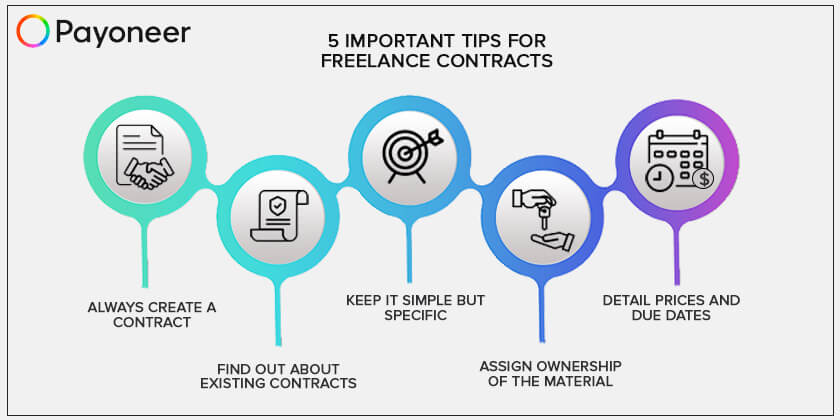
5 Important Tips for Freelance Contracts
A client accepts your proposal for a project and agrees to your rates. You’re excited and ready to get to work; however, one important detail remains before you put your skills and talents to good use: the contract. Check out these 5 important tips for creating a freelance writing contract.


Always Create a Contract
A contract forms a “meeting of the minds” between two people or groups. As a freelancer, you want to solidify such an agreement in writing so both you and your client understand the scope and specifics of the project. Without a contract, there is no way to prove who is correct if a dispute arises.
It’s not just to protect you from “shady” clients. Sometimes two professionals discuss a project, then leave the conversation with completely different ideas about the conclusions drawn. A contract eliminates such honest (but frustrating) misunderstandings.
Find Out About Existing Contracts
Many freelancers work through online marketplaces like Upwork, many of which provide contracts to clients and freelancers. These contracts prevent disputes through the marketplace and allow both parties to specify the details they want to include. Are you freelancing with international marketplaces and looking for a simple way to receive payments? Sign up for Payoneer today!
Keep It Simple But Specific
Contracts complicated by unnecessary legalese often do more harm than good. However, you don’t want to write a vague contract that leaves too little information on paper.Skip the legal jargon and write just as you speak. If you’re nervous about creating a contract on your own, download one on the Internet and modify it to suit your needs. Eliminate any clauses that don’t apply to your project.
Assign Ownership of the Material
Many freelancers create intellectual property that should be assigned to an owner. For example, if you create websites, ownership of your design and code should transfer to the client so he or she can use it legally. If you intend to retain full or partial ownership over copyright, specify it in the contract. Your contract should state that you give your client license to use said item (whether a photograph, logo etc.) for this specific project, but not for any other purpose unless you give written consent.
Detail Prices and Due Dates
Arguably the most important part of the contract are the due dates and payment schedule. Always specify how much you will be paid and when; additionally, be clear on exact dates on which your work is due to the client, and specify whether or not those due dates coincide with payments.For example, some freelancers are paid a portion up front, another portion after a rough draft is submitted, and the rest upon completion of the project. If you expect a schedule like this, don’t leave it out of the contract.
While you might assume that nothing will go wrong and that contracts waste your time, they can save you significant headaches and frustrations in the future. Take the time to write up a contract for each client so you both know exactly what to expect.




